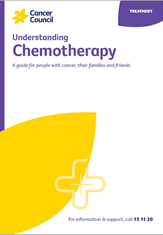- Home
- Thyroid cancer
- Treatment
- Chemotherapy
Chemotherapy for thyroid cancer
Chemotherapy is the use of drugs to kill cancer cells or slow their growth. It is not a very common treatment for thyroid cancer, but it may sometimes be used to treat advanced thyroid cancer that is not responding to RAI treatment or targeted therapy. It may also be used in combination with radiation therapy to treat anaplastic thyroid cancer.
Chemotherapy drugs are usually given by injection into a vein (intravenously). The number of treatment sessions and length of treatment time varies from person to person. Your treatment team will work out the best schedule for you.
Side effects of chemotherapy
The side effects of chemotherapy vary depending on the drugs used. Common side effects include:
- fatigue
- nausea
- appetite loss
- diarrhoea
- hair loss
- mouth sores
- anaemia.
You may also be more likely to catch infections.
Most chemotherapy side effects are temporary and your doctor will talk to you about ways to prevent or reduce them. You could be prescribed medicines to treat the side effects or be given a different type of drug, or your doctor may recommend a break from treatment.
To read more about treatments and side effects, see Surgery, Targeted therapy, Radiation therapy and Chemotherapy.
→ READ MORE: Immunotherapy and radionuclide therapy
Watch this short video to learn more about chemotherapy.
Podcast: Making Treatment Decisions
Listen now
More resources
A/Prof Diana Learoyd, Endocrinologist, GenesisCare North Shore, Faculty of Medicine and Health, University of Sydney, NSW; Emeritus Professor Leigh Delbridge AM, The University of Sydney, Thyroid Surgeon, The Mater and North Shore Private Hospitals, NSW; Prof Ruta Gupta, Tissue Pathology and Diagnostic Oncology, Royal Prince Alfred Hospital and The University of Sydney, NSW; Susan Leonard, Cancer Nurse Coordinator Thyroid and Brachytherapy, Cancer Care Services, Royal Brisbane and Women’s Hospital, QLD; Dr Dean Lisewski, Endocrine and General Surgeon, Fiona Stanley Hospital and St John of God Hospital, Murdoch, WA; Caitriona Nienaber, 13 11 20 Consultant, Cancer Council WA; Jonathan Park, Consumer; A/Prof David Pattison, Deputy Director and Senior Staff Specialist, Department of Nuclear Medicine and Specialised PET Services, Royal Brisbane and Women’s Hospital and School of Medicine, University of Queensland, QLD; Prof Bruce Robinson, Endocrinologist, Co-Head, Cancer Genetics, Kolling Institute of Medical Research, The University of Sydney and Royal North Shore Hospital, NSW; Marissa Ryan, Team Leader (Cancer) Pharmacist, Princess Alexandra Hospital, Brisbane, QLD.
View the Cancer Council NSW editorial policy.
View all publications or call 13 11 20 for free printed copies.
Need to talk?
Support services
Cancer Connect
Talk to someone who has experienced cancer
Work and cancer
Information for employees, employers and workplaces dealing with cancer
Cancer information
Chemotherapy common questions
Addresses chemotherapy concerns such as pain, time and pregnancy
Patient rights and responsibilities
What you can reasonably expect from your health care professionals

